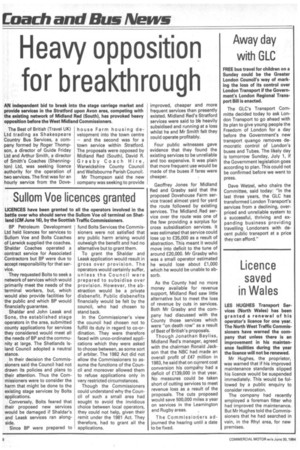Sullom Voe licences granted
Page 18

If you've noticed an error in this article please click here to report it so we can fix it.
LICENCES have been granted to all the operators involved in the battle over who should serve the Sullom Voe oil terminal on Shetland (CM June 16), by the Scottish Traffic Commissioners.
BP Petroleum Development Ltd held licences for services to Sullom Voe and Bolts Coaches of Lerwick supplied the coaches. Shaldar Coaches operated a contract service for Associated Contractors but BP were due to accept responsibility for that service.
They requested Bolts to seek a network of services which would primarily meet the needs of the terminal workers, but, which would also provide facilities for the public and which BP would financially guarantee.
Shaldar and John Leask and Sons, the established stage operators in the area, submitted county applications for services they considered would meet all the needs of BP and the community at large. The Shetlands Island Council adopted a neutral stance.
In their decision the Commissioners said the Council had not drawn its policies and plans to their attention. Thus the Commissioners were to consider the harm that might be done to the existing stage services by Bolts applications.
Conversely, Bolts feared that their proposed new services would be damaged if Shaldar's and Leask services ran alongside.
Since BP were prepared to fund Bolts Services the Commissioners were not satisfied that any public harm arising would outweigh the benefit and had no alternative but to grant them.
To grant the Shaldar and Leask application would result in gross over provision. The operators would certainly suffer, unless the Council were prepared to subsidise over provision. However, the abstraction would be a private disbenefit. Public disbenefits financially would be felt by the council, who had chosen to stand back.
In the Commissioner's view the council had chosen not to fulfill its duty in regard to co-ordination. They were therefore faced with unco-ordinated applications which they were asked to choose between, as some sort of arbiter. The 1982 Act did not allow the Commissioners to assume the functions of the Council and moreover allowed them to refuse applications only in very restricted circumstances.
Though the Commissioners could understand why the Council of such a small area had sought to avoid the invidious choice between local operators, they could not help, given their remit under the 1981 Act. They therefore, had to grant all the applications.






















































































